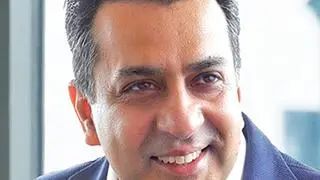Idea Cellular and Vodafone had announced on January 30 they were exploring a merger to create the country’s largest telecom company. Less than two months later, the duo signed the deal in an indication that the negotiations were quick and without complications. BusinessLine asked Vodafone’s Global CEO Vittorio Colao and Aditya Birla Group Chairman Kumar Mangalam Birla to explain how the combined strengths will help in a highly competitive market. Excerpts:
There is speculation that the transaction was expedited because of concerns about Jio. What’s your take on this?
Colao: You always talk about Jio but think about Airtel — they are the market leaders, they are very strong and they are ahead of the competitor. It is not just about Jio. It is a very competitive market that will continue to become competitive. Why are we going together? Over time we’ve built companies that are very complementary — different geographic focus but very well run, very complementary with respect to spectrum. There will not be a single circle where we will have less than 10 per cent market share. Which means that we can make money in each circle and reinvest money in each circle. Mr Birla and I have been in contact for many years, having conversations and thinking about the future. I think more than Jio, it is the arrival of data. It’s also happening in Europe. The same logic is driving our consolidation in Europe. Data is very capital heavy and requires a lot of companies to go together.
Vodafone had earlier said India is a jewel in its crown. Does this transaction make India less of a jewel for you?
Colao: India is a bigger jewel now, which will be shared between us and Birla Group. I always say that India has been wonderful for Vodafone from a market point of view, from brand point of view and from customer point of view. It has not been good from regulatory point of view because spectrum has been sold at prices that are too high, because competition and competition rules have been managed in a very erratic way. Hopefully, this move will create a better industry ratio. Five players, long term — all of us with a lot of spectrum, all of us with capacity to become pillars of digital India.
Recently, there have been allegations of favours being shown to one operator. Going forward, do you see regulatory hangover as a major headwind?
Calao: I think regulatory shouldn’t be seen as a headwind in any industry. Regulation should help an industry develop in an orderly way. I am confident that by going together, now we have a strong player. So now the regulator has a real chance to prove they are neutral, that they regulate what needs to be regulated and they allow good sustainable competition.
With the consolidation taking place in the telecom industry, do you foresee an end to the tariff war?
Birla: You still have five pretty solid players. You still have a very competitive market. It still remains an intensely competitive market.
While you talk about both the entities coming together equally, why is the transaction structured in such a complicated way?
Birla: The fact is that we have been valued equally by the valuers. Idea has promoter shareholding but we also have minority shareholders. The structure of the deal is such that Vodafone and the promoter of Idea Group — which is the Aditya Birla Group — have equal shareholdings, which is why the deal is structured the way it is.
Calao: Agreement starts with 45 per cent (Vodafone), 26 per cent (Idea) and we will meet somewhere in between because the spirit of the deal on the first day is equal partnership. We will not go to the excess shares. And once Birla Group has the shares it wants, the excess shares we have will be disposed.
The markets have not reacted well to the announcement, with Idea shares trading down. What’s your take on this?
Birla: I think there is some miscommunication, misunderstanding about the price at which ABG is going to buy shares of Idea from Vodafone, which I think is causing this. I assume that when you have such large transactions, it takes the market some time to grasp it completely. The management would’ve spent hundreds of hours to put together a scheme like this, obviously the market will take some time to understand it. I think it is a kneejerk reaction.
We believe this is based on business fundamentals. We’ve got complementary assets in terms of presence in different markets. Vodafone is more dominant in metros, we in urban and rural areas. We together will have a combined market share of about 40 per cent, combined customer share of about 30 per cent, a pool of spectrum of about 1850 MHz.
We hope to play a much more aggressive and significant role in the PM’s Digital India vision, contribute more significantly to the government’s financial inclusion vision. I think it is the business logic that has fundamentally driven this combination and I believe that for us as for any other shareholder of Idea, this is something that’ll create immense value.
Is there a rethink on telecom from the Birla Group?
Birla: We’ll not do something this big with a reputable international player if we were wanting to exit. This is a clear indication that we at Aditya Birla Group and Vodafone see this as our further commitment to India.








Comments
Comments have to be in English, and in full sentences. They cannot be abusive or personal. Please abide by our community guidelines for posting your comments.
We have migrated to a new commenting platform. If you are already a registered user of TheHindu Businessline and logged in, you may continue to engage with our articles. If you do not have an account please register and login to post comments. Users can access their older comments by logging into their accounts on Vuukle.